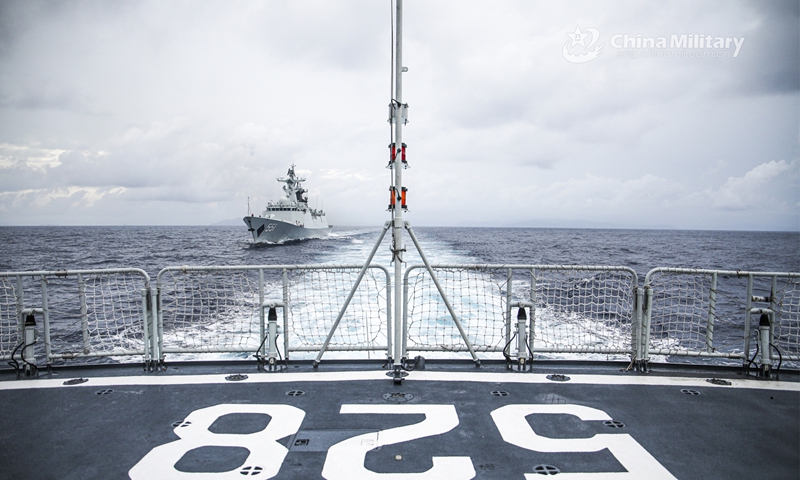
The guided-missile frigates Mianyang and Suining attached to a frigate flotilla with the navy under the PLA Southern Theater Command steam in astern formation during a maritime combat training exercise in mid July, 2023. (eng.chinamil.com.cn/Photo by Ge Hanqiang and Zhang Weifeng)
China reportedly launched the first hull of its new-generation frigate, allegedly designated the Type 054B, in Shanghai last week, with observers expecting it to be an advanced but also cost-effective versatile vessel for far sea operations.
Photos emerged on social media show that the first Type 054B has been launched at Hudong Zhonghua Shipyard in Shanghai, US-based news website The Drive reported on Monday.
Calling the frigate one of the Chinese People’s Liberation Army (PLA) Navy’s most important future vessels, The Drive said the Type 054B is likely a continuation of the previous Type 054A, as it is expected to primarily perform anti-submarine warfare mission with anti-air warfare and anti-surface warfare roles as secondary, general-purpose objectives.
It will likely host the shipborne version of the Z-20 helicopter, which would provide a critical part of the frigate’s anti-submarine warfare capabilities, the report said.
Compared with its predecessor, the Type 054B is larger, measuring about 147 meters in length and 18.5 meters in width with a displacement of around 6,000 tons, Navy Recognition, a dedicated naval news website, reported on Monday.
The new frigate is equipped with a dual-face active phased array radar system plus an integrated radio frequency mast similar to that on the Type 055 destroyer, Navy Recognition said, noting that this enhances the ship's air situational awareness and air defense capability.
Similar to the Type 054A, the Type 054B likely has a 32-cell vertical launch system that can accommodate HQ-16 long-range air defense missiles and Yu-8 rocket-assisted torpedoes, as well as two quadruple YJ-83 anti-ship missile launchers, according to Navy Recognition.
Instead of two 1130 close-in weapon systems equipped by the Type 054A, the Type 054B is armed with only one close-in weapon system, but is added with an HQ-10 short-range air defense missile system, the report said.
Another major change is that the Type 054B is seemingly fitted with a new 100mm main gun, replacing the Type 054A’s 76mm main gun and offering more range and power. This enhancement allows the Type 054B to better execute sea and shore bombardment missions, amplifying its combat prowess and diversified strike capabilities, Navy Recognition said.
Navy Recognition among other overseas media reports suggested that the Type 054B is likely equipped with a fully electric propulsion system.
China has not officially announced the launch of the new frigate or its details, including its name and capabilities.
It is normal that China develops new vessels amid technological developments and as its navy make strides toward becoming a blue-water navy, a Chinese military expert who requested anonymity told the Global Times on Tuesday.
Overseas media reports might not be accurate, but more details could emerge as the ship would eventually enter service, the expert said.
A far sea-operable frigate is generally characterized by its versatility, reliability, cost efficiency and comfortability, the expert said, stressing that not all advanced and expensive equipment should be hoarded on a frigate when destroyers are available.
Another hull of the Type 054B is under construction at Huangpu Wenchong Shipyard in Guangzhou, The Drive reported.
The new Type 054B frigate could be mass produced just like the Type 054A frigate and the Type 052D destroyer, as they are expected to accompany aircraft carriers, amphibious ships and destroyers in far sea voyages, analysts said.




